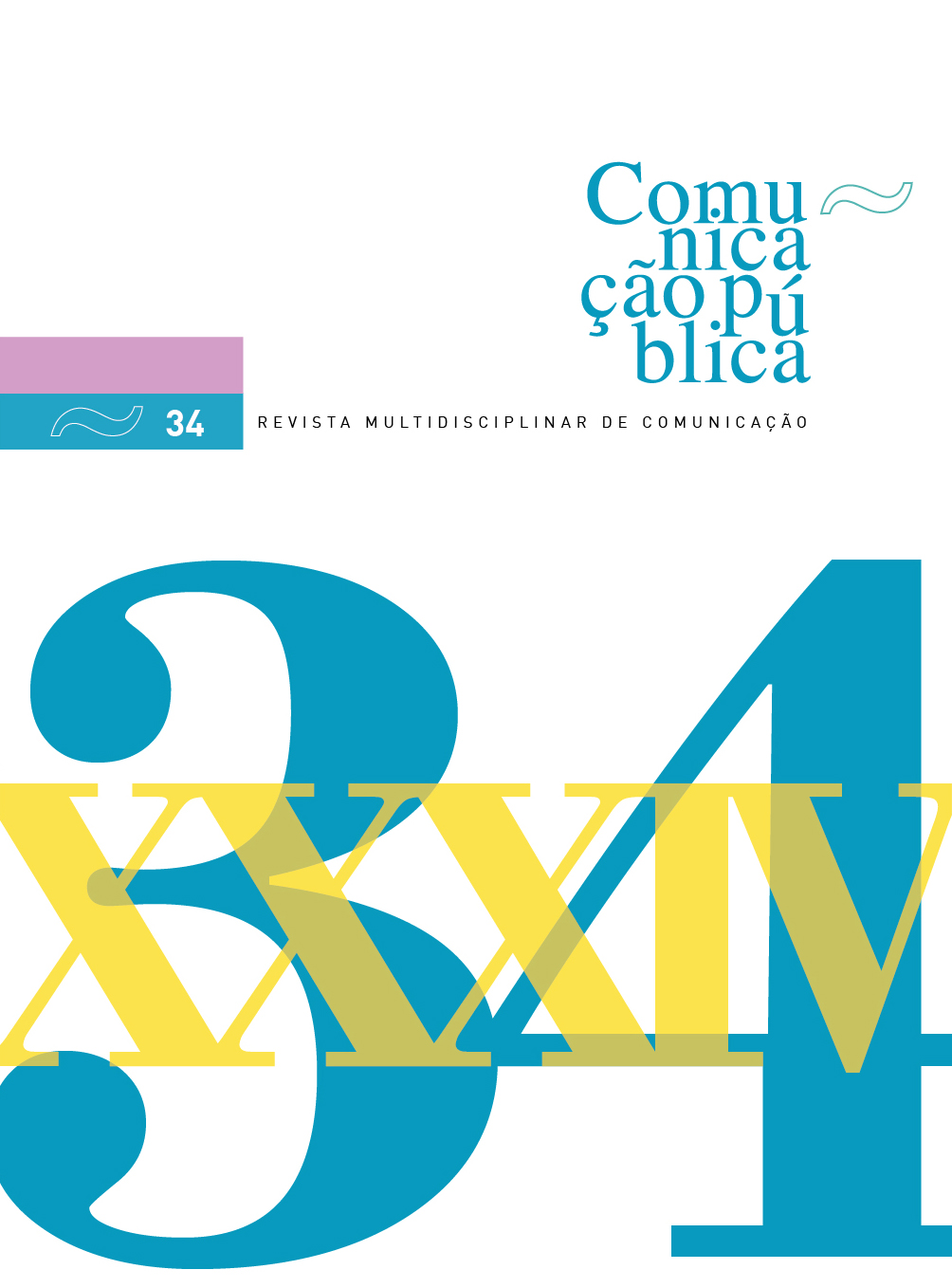Memory literacy
audiovisual fiction and its contribution to the construction of social memory
DOI:
https://doi.org/10.34629/cpublica.742Keywords:
audiovisual, history, memory, identityAbstract
In a society in which audiovisual culture has been gaining fruition time, anchored in the technological apparatus of screens, and strong consumption of fictional narratives, historical and period movies and series have become the main means of construction of narratives of the past and dissemination of memory, especially among millennials and subsequent generations (Rosenstone, 2018). This paper intends, in this way, to materialise as a first aproach to the concept of a memory literacy, where the plurality of forces that coexist in society, and the tension of different narratives that are in constant negotiation are recognised.
Downloads
References
Bhabha, H. (2006). Nation and narration. Routledge.
Bloch, M. (1993). Introdução à História. Publicações Europa-América.
Burnay, C. D. & Sardica, J. M. (2014). A história na ficção televisiva portuguesa. Universidade Católica Editora.
Curto, D. R. (2013). Para que serve a História. Tinta-da-China.
Fentress, J. & Wickman, C. (1994). Memória social. Novas perspectivas sobre o passado. Teorema.
Ferro, M. (2017). A cegueira. Uma outra história do nosso mundo. Cavalo de Ferro.
Foucault, M. (1997). A ordem do discurso. Relógio D’Água.
Goodman, N. (1995). Modos de fazer mundos. Edições ASA.
Halbwachs, M. (1990). A memória coletiva. Edições Vértice.
Hall, S. (2005). A identidade cultural na Pós-Modernidade. DP&A editora.
Matos, Sérgio. (2000), História e ficção em Oliveira Martins. Revista História das Ideias. Volume 21. 159-161.
Peralta, E. (2007). Abordagens teóricas ao estudo da memória social: uma resenha crítica. Arquivos da Memória. Antropológica, Escala e Memória, 2 (Nova Série), Centro de Estudos de Etnologia Portuguesa.
Thanouli, E. (2019). History and Film. A tale of two disciplines. Bloomsbury Academic.
Rosenstone, R. A. (2018). History on film/Film on History (3.ª ed.). Routledge.
Spivak, G. C. (2021). Pode a subalterna tomar a palavra?. Orfeu Negro.
Todorov, T. (1992). As morais da História. Publicações Europa-América.
White, H. (1988). Historiography and historiophoty. The American Historical Review, 93(5), 1193-1199. http://www.jstor.org/stable/1873534.
Williams, R. (1995). The sociology of culture. University of Chicago Press.
Williams, R. (2003). Television: Technology and cultural form. Routledge.
BIBLIOGRAFIA CONSULTADA /OTHER REFERENCES CONSULTED
Appadurai, A. (2004). Dimensões culturais da globalização. Teorema.
Aristóteles. (s.d.). Poética (5.ª ed.). Imprensa Nacional – Casa da Moeda.
Barthes, R. (1997). Crítica e verdade. Edições 70.
Bhabha, H. (2004). The location of Culture. Routledge.
Bourdieu, P. (2021). O poder simbólico. Edições 70.
Buonanno, M. (1999). El drama televisivo. Identidad y contenidos sociales. Gedisa Editorial.
Burke, P. (1992). O mundo como teatro. Difel.
Campbell, J. (2008). O herói das mil faces (15.ª ed.). Cultrix/Pensamento.
Campbell. J. & Moyers, B. (2003). O poder do mito. Editora Palas Athena.
Candau, J. (2019). Memória e identidade. Editora Contexto.
Condorcet. (2013). Esboço de um quadro histórico dos progressos do espírito humano. Editora Unicamp.
Conrad, S. (2019). O que é a História Global. Edições 70.
Duby, G. (1999). Para uma história das mentalidades. Terramar.
Eagly, A. H. & Wood, W. (2012). Social role theory. Handbook of Theories of Social Psychology, 458-476. https://doi.org/10.4135/9781446249222.n49.
Eliade, M. (1992). O sagrado e o profano. Livraria Martins Fontes.
Eliade, M. (2019). O mito do eterno retorno. Edições 70.
Elsaesser, T. & Hagener, M. (2015). Introducción a la teoría del cine. UA Ediciones.
Esquenazi, J. (2006). Sociologia dos públicos. Porto Editora.
Farias, F. (Org.). (2011). Apontamentos em memória social. ContraCapa.
Gadamer, H.-G. (1998). O problema da Consciência Histórica. Estratégias Criativas.
Giddens, A. (2005). O mundo na era da globalização. Editorial Presença.
Grant, B. K. (2010). Film genre reader III (3.ª ed.). University of Texas Press.
Hobsbawn, E. (2010). Escritos sobre a História. Relógio D’Água.
Huizinga, J. (2019). Homo Ludens. Perspectiva.
Jost, F. (2012). Do que as séries americanas são sintoma? Editora Sulina.
Lamb, V. M. (2011). The 1950’s and the 1960’s and the American Woman: the transition from the “housewife” to the feminist. History.
Le Goff, J. (2021). História & Memória. Editora Unicamp.
Lessing, G. (2005). Dramaturgia de Hamburgo. Fundação Calouste Gulbenkian.
Lugones, M. (2010b). Toward a decolonial feminism. JSTOR, 25(4), 742-759.
Martín-Barbero, J. & Rey. G. (1999). Los ejercicios del ver. Hegemonia audiovisual y Ficción Televisiv. Gedisa Editorial.
Martín-Barbero, J. (2014). Dos meios às mediações. Editora UFRJ.
Mattoso, J. (1997). A escrita da História. Editorial Estampa.
Mcluhan, M. (1970). A galáxia de Gutenberg. Editora da Universidade de São Paulo.
Mcluhan, M. (2006). Os meios de Comunicação como extensões do Homem. Cultrix.
McLuhan, M. & Powers, B. (1992). The global village. Oxford University Press.
Morin, E. (2002). O Método IV. As ideias: a sua natureza, vida, habitat e organização (2.ª ed.). Publicações Europa-América.
O’Brien, P. (2006). Historiographical traditions and modern imperatives for the restoration of global history. Journal of Global History, 1(1), 3-39. https://doi.org/10.1017/s1740022806000027.
Pontes, J. (2011). História, memória e política. Ler História, 60, 185-192. https://doi.org/10.4000/lerhistoria.1546.
Robertson, R. (1992). Globalization. Social theory and global culture. Sage.
Russell, B. (1993). O poder. Uma nova análise social. Fragmentos.
Silva, S. & Pereira, S. (2014). 2.º Congresso Literacia, Media e Cidadania. Livro de Atas. https://repositorium.sdum.uminho.pt/handle/1822/29811.
Sorlin, P. (1997). Mass media. Celta.
Southgate, B. (2014). History meets fiction. Routledge.
Thornley, D. (2018, November 14). True event adaptation: Scripting real lives. Academia. https://www.academia.edu/37768159/True_Event_Adaptation_Scripting_Real_Lives.
Traverso, E. (2005). Le passé, modes d’emploi: histoire, mémoire, politique. Le Fabrique Editions.
Warnie, J.-P. (2002). A mundialização da Cultura. Editorial Notícias.
White, H. (1981). The narrativization of real events. Critical Inquiry, 7(4), 793-798. http://www.jstor.org/stable/1343152.
White, H. (2007). Introduction: Historical fiction, fictional history, and historical reality. Rethinking History, 9(2-3), 147-157. https://doi.org/10.1080/13642520500149061.
Downloads
Published
Issue
Section
License
Copyright (c) 2023 Direitos do Autor (c) 2023

This work is licensed under a Creative Commons Attribution-NonCommercial 4.0 International License.
Os conteúdos da Comunicação Pública estão licenciados com uma licença Creative Commons - Atribuição-NãoComercial 4.0 Internacional.


